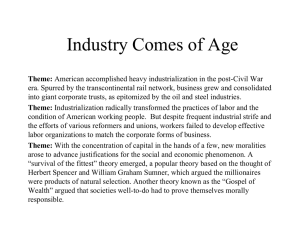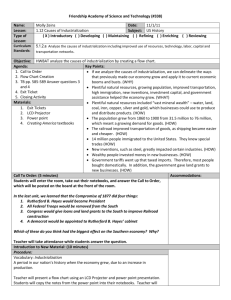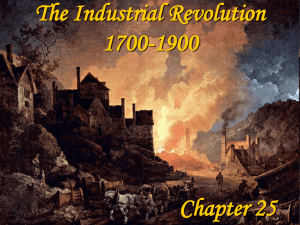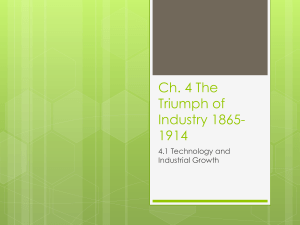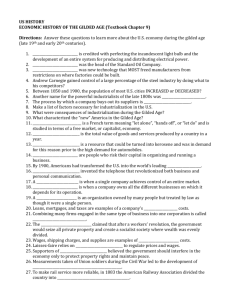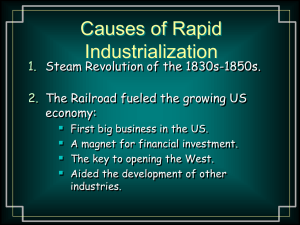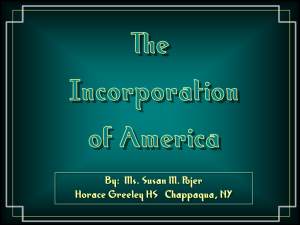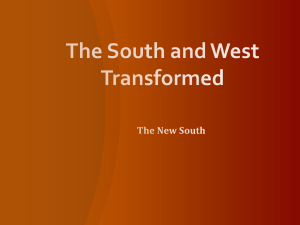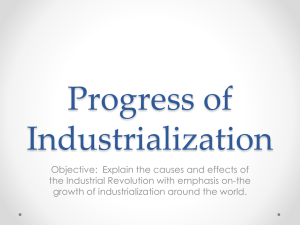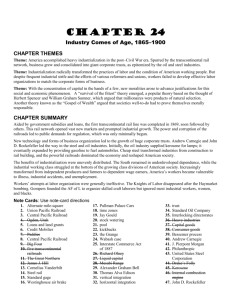Causes of Rapid Industrialization
advertisement
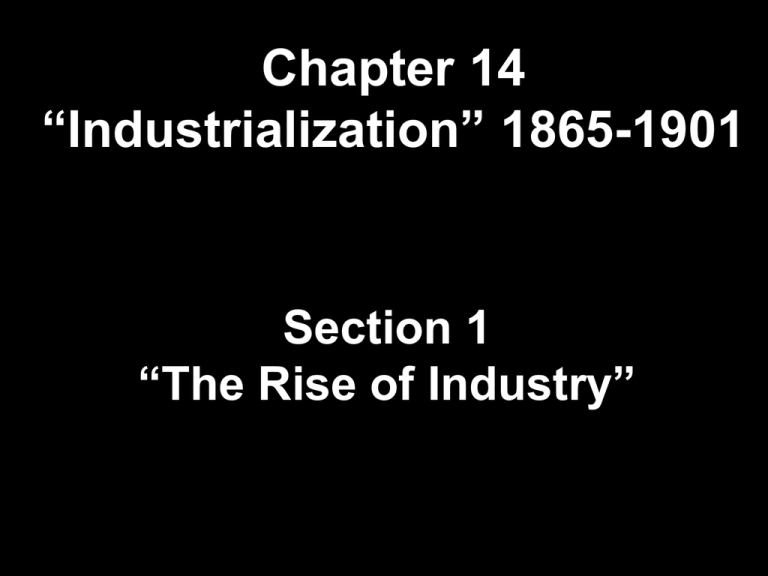
Chapter 14 “Industrialization” 1865-1901 Section 1 “The Rise of Industry” Causes of Rapid Industrialization 1. Steam Revolution of the 1830s-1850s. 2. The Railroad fueled the growing US economy: First big business in the US. A magnet for financial investment. The key to opening the West. Aided the development of other industries. Causes of Rapid Industrialization 3. Technological innovations. Bessemer and open hearth process Refrigerated cars Edison o “Wizard of Menlo Park” o light bulb, phonograph, motion pictures. Causes of Rapid Industrialization 4. Unskilled & semi-skilled labor in abundance. 5. Abundant capital. 6. New, talented group of businessmen [entrepreneurs] and advisors. 7. Market growing as US population increased. 8. Government willing to help at all levels to stimulate economic growth. 9. Abundant natural resources. New Business Culture 1. Laissez Faire the ideology of the Industrial Age. Individual as a moral and economic ideal. Individuals should compete freely in the marketplace. The market was not man-made or invented. No room for government in the market! Thomas Alva Edison “Wizard of Menlo Park” The Light Bulb The Phonograph (1877) The Ediphone or Dictaphone The Motion Picture Camera Alexander Graham Bell Telephone (1876) Alternate Current George Westinghouse Alternate Current Westinghouse Lamp ad The Airplane Wilbur Wright Orville Wright Kitty Hawk, NC – December 7, 1903 Model T Automobile Henry Ford I want to pay my workers so that they can afford my product! U. S. Patents Granted 1790s 276 patents issued. 1990s 1,119,220 patents issued. Chapter 14 “Industrialization” 1865-1901 Section 2 “The Railroads” •May 10, 1869 at Promontory, Utah •“The Wedding of the Rails” •Central Pacific and Union Pacific Promontory, Utah “The Big Four” Railroad Magnates •Financed the Central Pacific •Hired Chinese men to do the labor Charles Crocker Mark Hopkins Collis Huntington Leland Stanford •They had to cut through the Sierra Nevada mountain range. Effects Development of time zones Sped long-distance transportation Longer and heavier trains used Nationwide Rail Network Rate per mile declined united America’s regions Promoted a national market Land grants Private investment Ways Railroads Were Financed Gifts of public lands to R.R. Money generated from running the railroads Chapter 14 “Industrialization” 1865-1901 Section 3 “Big Business” New Business Culture: “The American Dream?” 3. Protestant (Puritan) “Work Ethic” Horatio Alger [100+ novels] Is the idea of the “self-made man” a MYTH?? 1. New Type of Business Entities Pool 1887 Interstate Commerce Act Interstate Commerce Commission created. 2. Trust John D. Rockefeller Standard Oil Co. Standard Oil Co. New Type of Business Entities 2. Trust: Horizontal Integration John D. Rockefeller Vertical Integration: o Gustavus Swift Meat-packing o Andrew Carnegie U. S. Steel Iron & Steel Production New Type of Business Entities U. S. Corporate Mergers New Financial Businessman The Broker: J. Pierpont Morgan Wall Street – 1867 & 1900 The Reorganization of Work Frederick W. Taylor The Principles of Scientific Management (1911) The Reorganization of Work The Assembly Line % of Billionaires in 1900 % of Billionaires in 1918 The Protectors of Our Industries The ‘Bosses’ of the Senate The ‘Robber Barons’ of the Past Cornelius [“Commodore”] Vanderbilt Can’t I do what I want with my money? William Vanderbilt $ The public be damned! $ What do I care about the law? H’aint I got the power? Regulating the Trusts 1877 Munn. v. IL 1886 Wabash, St. Louis & Pacific Railroad Company v. IL 1890 Sherman Antitrust Act in “restraint of trade” “rule of reason” loophole 1895 US v. E. C. Knight Co. Relative Share of World Manufacturing Modern ‘Robber Barons’?? Chapter 14 “Industrialization” 1865-1901 Section 4 “Unions” Labor Unrest: 1870-1900 The Molly Maguires (1875) James McParland The Corporate “Bully-Boys”: Pinkerton Agents Management vs. Labor “Tools” of Management “Tools” of Labor “scabs” boycotts P. R. campaign sympathy demonstrations Pinkertons lockout blacklisting yellow-dog contracts informational picketing closed shops court injunctions organized strikes open shop “wildcat” strikes A Striker Confronts a SCAB! Knights of Labor Terence V. Powderly An injury to one is the concern of all! Knights of Labor Knights of Labor trade card ù Goals of the Knights of Labor Eight-hour workday. ù Workers’ cooperatives. ù Worker-owned factories. ù Abolition of child and prison labor. ù Increased circulation of greenbacks. ù Equal pay for men and women. ù Safety codes in the workplace. ù Prohibition of contract foreign labor. ù Abolition of the National Bank. The Great Railroad Strike of 1877 The Great Railroad Strike of 1877 The Tournament of Today: A Set-to Between Labor and Monopoly Anarchists Meet on the Lake Front in 1886 Haymarket Riot (1886) McCormick Harvesting Machine Co. Haymarket Martyrs

